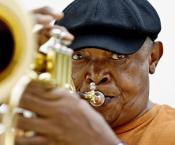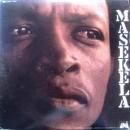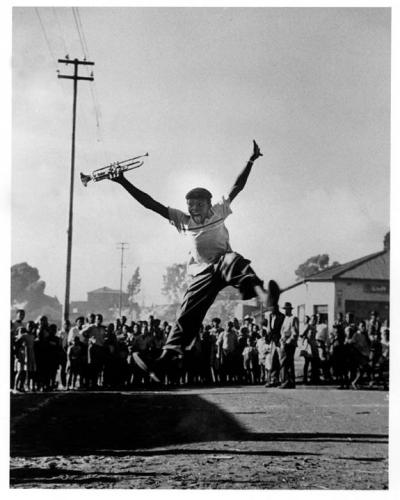There is a train that comes from Namibia and Malawi
there is a train that comes from Zambia and Zimbabwe,
There is a train that comes from Angola and Mozambique,
From Lesotho, from Botswana, from Swaziland,
From all the hinterland of Southern and Central Africa.
This train carries young and old, African men
Who are conscripted to come and work on contract
In the golden mineral mines of Johannesburg
And its surrounding metropolis, sixteen hours or more a day
For almost no pay.
Deep, deep, deep down in the belly of the earth
When they are digging and drilling that shiny mighty evasive stone,
Or when they dish that mish mesh mush food
into their iron plates with the iron shank.
Or when they sit in their stinking, funky, filthy,
Flea-ridden barracks and hostels.
They think about the loved ones they may never see again
Because they might have already been forcibly removed
From where they last left them
Or wantonly murdered in the dead of night
By roving, marauding gangs of no particular origin,
We are told.
They think about their lands, their herds
That were taken away from them
With a gun, bomb, and the teargas, the gatling and the cannon.
And when they hear that Choo-Choo train
A-chugging, and a pumping, and a smoking, and a pushing, a pumping, a crying and a steaming and a chugging and a whooo whooo!
They always cuss, and they curse the coal train,
The coal train that brought them to Johannesburg. Whooo whooo!
Stimela (*)
Sihamba ngamalahle
Sivel' eTalakubayi
Sangilahla kwaGuqa
Bathi sizoba amalahle.
Iyohhh...
(Stimela)
Sidl' inyol' enkomponi.
(Stimela!)
Sihleli njengezinja, siyelele mame
Emikodini, babe
Sikhalel' izihlobo zethu
(Masibuyele le! eTalakubayi)
Sikhalel' izingane zethu wololo!
(Masibuyele le! eTalakubayi)
Sikhalel' abazali bethu!
(Masibuyele le! eTalakubayi)
Sikhalel' abafazi bethu, sithi
Yelele yelele yelele yelele yelele
(Masibuyele le! Etalakubayi)
Stimela
Sihamba ngamalahle,
Sivel' eTalakubayi.
Helele bathi Stimela mawo
Stimela
Sihamba ngamalahle,
Sivel' eTalakubayi.
Stimela!
Sihamba ngamalahle,
Sivel' eTalakubayi.
there is a train that comes from Zambia and Zimbabwe,
There is a train that comes from Angola and Mozambique,
From Lesotho, from Botswana, from Swaziland,
From all the hinterland of Southern and Central Africa.
This train carries young and old, African men
Who are conscripted to come and work on contract
In the golden mineral mines of Johannesburg
And its surrounding metropolis, sixteen hours or more a day
For almost no pay.
Deep, deep, deep down in the belly of the earth
When they are digging and drilling that shiny mighty evasive stone,
Or when they dish that mish mesh mush food
into their iron plates with the iron shank.
Or when they sit in their stinking, funky, filthy,
Flea-ridden barracks and hostels.
They think about the loved ones they may never see again
Because they might have already been forcibly removed
From where they last left them
Or wantonly murdered in the dead of night
By roving, marauding gangs of no particular origin,
We are told.
They think about their lands, their herds
That were taken away from them
With a gun, bomb, and the teargas, the gatling and the cannon.
And when they hear that Choo-Choo train
A-chugging, and a pumping, and a smoking, and a pushing, a pumping, a crying and a steaming and a chugging and a whooo whooo!
They always cuss, and they curse the coal train,
The coal train that brought them to Johannesburg. Whooo whooo!
Stimela (*)
Sihamba ngamalahle
Sivel' eTalakubayi
Sangilahla kwaGuqa
Bathi sizoba amalahle.
Iyohhh...
(Stimela)
Sidl' inyol' enkomponi.
(Stimela!)
Sihleli njengezinja, siyelele mame
Emikodini, babe
Sikhalel' izihlobo zethu
(Masibuyele le! eTalakubayi)
Sikhalel' izingane zethu wololo!
(Masibuyele le! eTalakubayi)
Sikhalel' abazali bethu!
(Masibuyele le! eTalakubayi)
Sikhalel' abafazi bethu, sithi
Yelele yelele yelele yelele yelele
(Masibuyele le! Etalakubayi)
Stimela
Sihamba ngamalahle,
Sivel' eTalakubayi.
Helele bathi Stimela mawo
Stimela
Sihamba ngamalahle,
Sivel' eTalakubayi.
Stimela!
Sihamba ngamalahle,
Sivel' eTalakubayi.
(*) vedi la traduzione
Contributed by Alessandro - 2010/2/8 - 08:45
Il grande cornettista, compositore e cantante sudafricano Hugh Ramapolo Masekela è morto lo scorso 23 gennaio.
Mi corre l'obbligo di provare - almeno ci provo, dato che c'è di mezzo una lingua africana, credo lo zulu - a proporre la versione completa del testo di questa meravigliosa canzone, che ho trovato qui
In sostituzione del precedente.
Mi corre l'obbligo di provare - almeno ci provo, dato che c'è di mezzo una lingua africana, credo lo zulu - a proporre la versione completa del testo di questa meravigliosa canzone, che ho trovato qui
In sostituzione del precedente.
Bernart Bartleby - 2018/1/29 - 22:21
Language: English
Una traduzione inglese (almeno parziale) della parte in zulu tratta dai commenti al video su YouTube
Stimela sihamba ngamalahle, (The train that drives using coal)
Sivela eDalaku Bay (Coming from Delgoa Bay - Now Maputo)
Sangilahla kwa-Guqa (It dropped me off Kwa-Guqa - Witbank – Emalahleni)
Bathi sizomba amalahle (They say we are here to mine for coal)
Sihleli njenge Zinja (We live like dogs)
Emigodini (Underground)
Sikhalel' izihlobo zethu (We weep for our relatives)
Masibuyeleni ekhaya bo (Let's go back home)
Sikhalel' izingane zethu (We weep for our children)
Masibuyeleni ekhaya bo (Let's go back home)
Sikhalel' amaCherrie wethu (We weep for our girlfriends)
Masibuyeleni ekhaya bo (Let's go back home)
Sikhalel' abazali bethu (We weep for our parents)
Masibuyeleni ekhaya bo (Let's go back home)
Sivela eDalaku Bay (Coming from Delgoa Bay - Now Maputo)
Sangilahla kwa-Guqa (It dropped me off Kwa-Guqa - Witbank – Emalahleni)
Bathi sizomba amalahle (They say we are here to mine for coal)
Sihleli njenge Zinja (We live like dogs)
Emigodini (Underground)
Sikhalel' izihlobo zethu (We weep for our relatives)
Masibuyeleni ekhaya bo (Let's go back home)
Sikhalel' izingane zethu (We weep for our children)
Masibuyeleni ekhaya bo (Let's go back home)
Sikhalel' amaCherrie wethu (We weep for our girlfriends)
Masibuyeleni ekhaya bo (Let's go back home)
Sikhalel' abazali bethu (We weep for our parents)
Masibuyeleni ekhaya bo (Let's go back home)
×
![]()
Note for non-Italian users: Sorry, though the interface of this website is translated into English, most commentaries and biographies are in Italian and/or in other languages like French, German, Spanish, Russian etc.








Album "I Am Not Afraid", registrato a Los Angeles nella primavera del 1974.
Uno dei classici del grande musicista sudafricano (che fu anche compagno di Miriam Makeba), una canzone dedicata ai lavoratori delle miniere di Johannesburg.